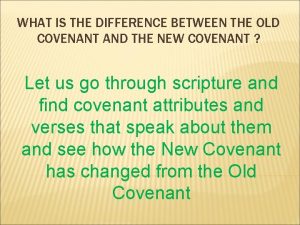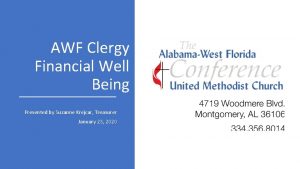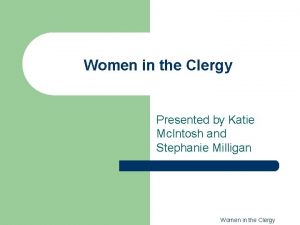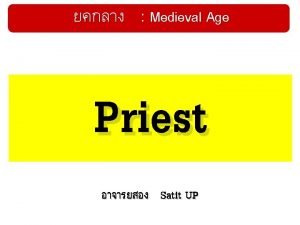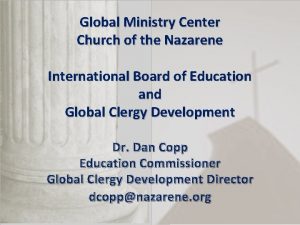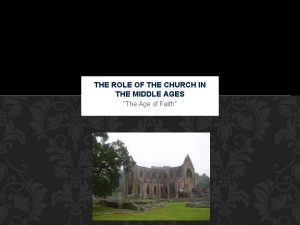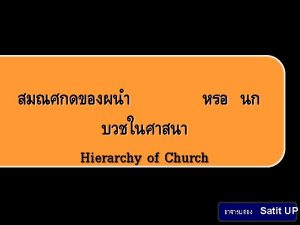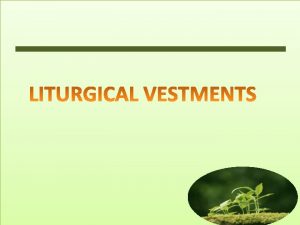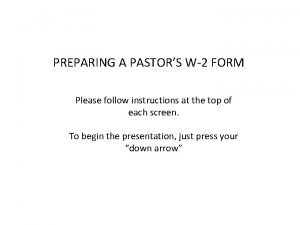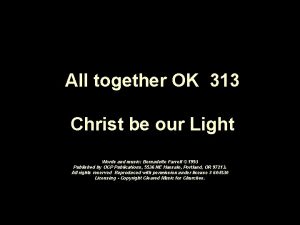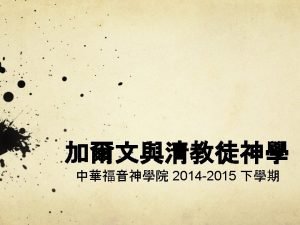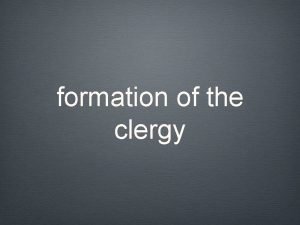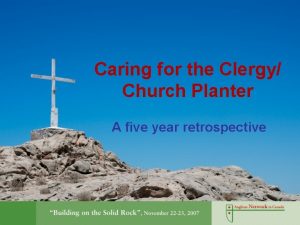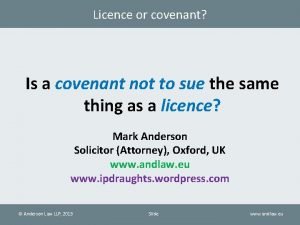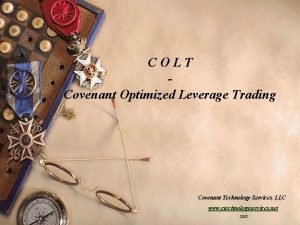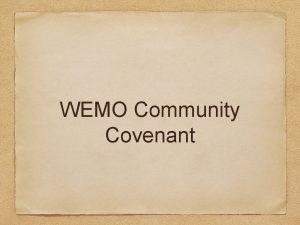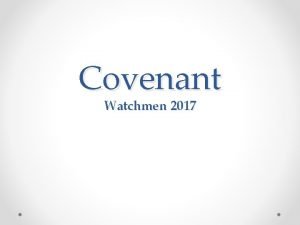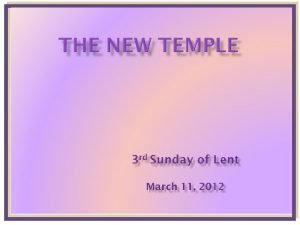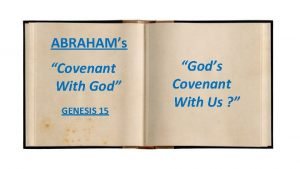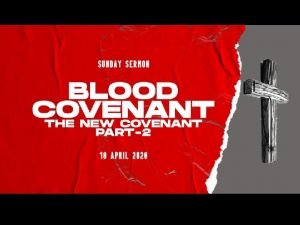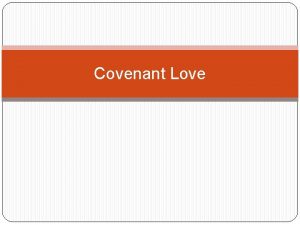THE CLERGY COVENANT CARING FOR OUR CLERGY David















- Slides: 15

THE CLERGY COVENANT CARING FOR OUR CLERGY David Coulston Diocesan Lay Chair

Why now? • The House of Clergy of General Synod have been looking at serious concerns regarding clergy care for some time. • They concluded that the best way forwards was through a ‘covenant’ as a means of engaging all parties. • The Covenant was made ‘An Act of Synod’ in February 2019. • Within our diocese, the covenant was ‘proclaimed’ at the autumn 2020 Diocesan Synod – so, properly caring for the clergy is the way we do things!

What does the Covenant say? The Church of England is part of the One, Holy, Catholic and Apostolic Church, worshipping the one true God, Father, Son and Holy Spirit. It professes the faith uniquely revealed in the Holy Scripture and set forth in the catholic creeds, which faith the Church is called upon to proclaim afresh in every generation. In its formularies, the Church of England recognises that God calls men and women to serve as deacons, priests and bishops to build up and equip the whole People of God. Conscious that such a calling is both a privilege and a demand, we as the Church of England commit together to promote the welfare of our clergy and their households in terms expressed in the Covenant for Clergy Care and Wellbeing. We undertake to work together to seek to coordinate and improve our approach to clergy care and wellbeing that ordained ministers flourish in their service of the mission of God within and beyond the Church.

OK – but what does the covenant demand of us? In effect, it’s an undertaking between the clergy and the whole church in which: • The Church (its leaders and its congregations) agrees to take care of clergy, for example providing support and training • The clergy agree to take proper care of themselves taking appropriate advantage of all that is available to them – including oportunities for recharging their spiritual and physical batteries. • And it is not just the clergy themselves – but properly supporting their households as well.

And for those who like a little more detail! Bishops and wider church Supporting clergy by prayer education / training good policies / procedures training / educating laity to support clergy • And much more! • • Clergy Looking after themselves and colleagues by • setting aside time for rest and self-care and study • understanding how their ministry is seen by others • And much more! Local Church Supporting clergy by • Prayer • being active and not passive • not looking for a super human – being realistic in expectations and planning • making sure the clergy both have and take opportunities for rest • And again, much more! Try to imagine what it would feel like if you were in their shoes!

And there’s more! • Chaplaincies are encouraged to engage in exploring the issues locally. • You can find a wealth of useful literature at the Cof. E web site (link below). • A good starting point is ‘How clergy Thrive’ by Liz Graveling of the Cof. E Ministry Team. (Available from Church House Publishing). The Covenant https: //www. churchofengland. org/resources/clergy-resources/national-clergy-hr/supporting-clergy-health-and -wellbeing/covenant How Clergy Thrive https: //www. chpublishing. co. uk/books/9781781402139/how-clergy-thrive

Some Diocesan Nuts and Bolts What have we already been doing?

2018 – A confidential survey of clergy • Undertaken by Tuomas Makipaa (Clergy Chair of Diocesan Synod) & David Coulston. • Sought the views of clergy on a range of matters: from how well they felt supported by our Bishops and Archdeacons; to how they felt valued and supported by their local congregations. • We had a 55% response which Tuomas and I considered provided a good representation of views. And those views were very illuminating! • And it was confidential – so no detail was shared with the Bishops, the Archdeacons nor anyone else! But it led to action fully endorsed by Bishops Staff Meeting!

What did the survey reveal? • Quite simply: when we get it right we get it really right – but when we get it wrong………. !!!! • This applied to: • The support chaplains felt they needed from Archdeacons and Bishops; and • How people felt they were being supported by their local congregations.

And in a little more detail- support from Bishops and Archdeacons… • More direct contact and support of chaplains by Bishops and Archdeacons other than for liturgical reasons. In particular: • Ensuring that chaplains are fully and properly prepared. • Fully supporting chaplains throughout their ministry. • Assisting where there are local issues (bullying, intransigence etc). • Key to this has been the appointment of full-time Archdeacons – and this is proceeding and beginning to show fruit.

And in a little more detail- support from local congregations… Clear guidance and statements of best practice to the laity in chaplaincies on: • What is needed for local support on appointment. • What is needed for ongoing support both generally and in respect of problem matters such as bullying and difficult personalities. • Matters relating to accommodation and chaplaincy transport. • Financial matters particularly stipends, pensions, local taxes etc.

And so the idea of ‘User Guides’ emerged • These aim to provide simple and clear guidance for congregations to address the problems encountered by chaplains. • They are being produced by the ‘Diocesan Lay Leadership Team’ comprising the Archdeaconry/Deanery Lay Chairs (or equivalent) with help from a number of people around the diocese. • And, in doing this, recognising that not everyone will have a background of Cof. E practices This is a great blessing to our enriched ministry but as part of the Cof. E there are somethings that need to be understood. (Well - every organisation has a rule book! – ours are included in the various Canons and Measures!) • And the finished products are endorsed by Bishops Staff Meeting

The ‘User Guides’ to date We have now issued 5 guides (plus a general introduction). You can find these on the Diocesan Web Site under ‘resources’. • Preparing for a new chaplain – and their family. • Welcoming a new chaplain – and their family. • How we run our chaplaincies. • Chaplaincy accommodation and transport. • General support – retreats, cluster groups and much more.

‘User Guides’ in the pipeline There a number of guides in the pipeline (and no doubt others will emerge as time moves on): • The role of a chaplain. • Paying stipends and expenses • Full, part or no stipend – what might it mean? And running in parallel, Bishop Robert is intending that the current Bullying Policy will be reviewed to ensure it is fully fit for purpose as we move forwards – watch this space.

So where should we be heading? • Do please take on board the covenant and talk about it within your chaplaincies – in council meetings and beyond! • Use the ‘User Guides’! As a minimum they are a check list to see if all is in order, or are there things you could do better? (By the way, the ‘guides’ set the standard – if you can do more then brilliant! If you have trouble in matching the guide – please talk to the Archdeacon). • All this, of course, aimed at supporting our clergy in Growing the Kingdom. Remember the emerging Church of England thinking: ‘Jesus Christ centred & shaped. Simpler, humbler, bolder’
 What is the difference between the old and new covenant
What is the difference between the old and new covenant Jean watson theory
Jean watson theory Key club cnh
Key club cnh Clergy financial
Clergy financial Clergy definition
Clergy definition Hierarchy of the catholic church
Hierarchy of the catholic church Church of the nazarene global ministry center
Church of the nazarene global ministry center Social structure of catholic church
Social structure of catholic church Clergy and nobles
Clergy and nobles Clergy ranks
Clergy ranks Long white linen garment
Long white linen garment W2 for pastors
W2 for pastors God our father christ our brother
God our father christ our brother Marcus aurelius our life is what our thoughts make it
Marcus aurelius our life is what our thoughts make it Christ be our light bernadette farrell
Christ be our light bernadette farrell Who wrote the poem money madness
Who wrote the poem money madness
